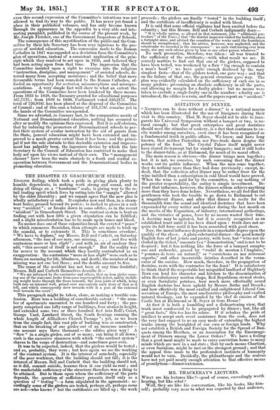THE DISASTER IN GRACECHURCll STREET.
ENGLISH feeling, which took a pride in giving plain plenty to humble dependents, in making work strong and sound, and in doing all things on a " handsome" scale, is giving way to the re- tail trading spirit which lives by eating into the "margin" allowed by the older liberality ; and we cannot agree that the new plan is wholly satisfactory or safe. It explodes now and then, in a steam- boat boiler, pressed beyond its power ; is dashed to pieces in a rail- way " accident "; or breaks down in some edifice, as in the recent "accident" in Gracechureh Street. The contract system is bent on finding out with how little a given stipulation can be fulfilled ; and a slight miscalculation has to be made up in bones and blood. No sooner does one of these calamities break the coveted " peace" in which commerce flourishes, than attempts are made to hush up the scandal, or to extenuate it. This is sometimes overdone. " We have to deplore," say Messrs. Bell and Corbett, on Saturday afternoon, "the loss of one man, one missing, . . . . and five with contusions more or less slight" ; and with an air of candour they add, " this account, of itself is sad enough." But the reality was far nearer to the account which they hastily, contradicted as an exaggeration : the contusions "more or less slight" were such as to three ten maiming for life„ blindness, and death ; the number of men missing was not one but three; • and the deaths amount to five.
The cause of the accident has not been at any time doubtful; Messrs. Bell and Corbett themselves describe it-
" We are informed by the contractor and others, that an iron girder cross- ing one df the staircases broke from seine imperceptible defect, and by its fall- ing weight broke through the floors beneath, the iron joists of which, being built into an internal wall, prized over successively each story of that as it fell, and which consequently drew inwards with it a part of the external wall towards the court.'
This paragraph might be taken, alone, as making a terrible con- fession. Here was a building of considerable extent : " the num- ber of apartments amounted to one hundred and forty ; the pro- perty comprised one lofty range of buildings, four stories in height, and extended some two or three hundred feet into Ball's Court, George Yard, Lombard Street, the South frontage running the whole length of Allhallows Church Passage "; yet, as we learn from the simple fact, this vast pile of building was so constructed, that on the breaking of one girder out of an immense number— one account says three thousand — the edifice gives way ! A " flaw " in a single girder, out of so many, can bring it all down : such is the excessive closeness with which "the contract system" shaves to the verge of destruction—and sometimes goes over.
It was to be expected, indeed, that the girders would be tested ; and so, probably, they were ; but hero again we see the working of the contract, system. It is the interest of somebody, especially of the poor workman, that the building should not fall; it is the interest of Messrs. Bell and-Corbett that the building should not, as it did, commit suicide, bemuse then it can yield no rent • and the marketable sufficiency of the structure- therefore was a thing to be attained. But to those upon whom the sufficiency of the parts depends, the question of sufficiency presents itself only as a question of " testing "—a form stipulated in the agreement : ac- cordingly some of the girders are tested, perhaps all, perhaps some are not—who knows ? but the certificates are filled up ; the work
proceeds ; the girders are finally " tested" in the building itself ; and the certificate of insufficiency is sealed with blood. It is said that some official vigilance had been excited before the calamity; but this Messrs. Bell and Corbett indignantly deny-
" It is wholly untrue, as alleged in that statement, Lthe " additional par- ticulars" of the Times,] that 'the district inspector visited the building about a fortnight since, and advised the cessation of the works until the foundation should be strengthened ; that his advice, however, was neglected, and the catastrophe we recorded is the consequence' : no such visit having ever been made, nor any such advice given by him or any other person whatever." No such precaution, therefore, was taken : all was trusted to the sufficiency of the certificate,—with what result we see. It scarcely matters to find out that one of the girders, supposed to have been tested, was weakened by a flaw " big enough to contain a man's head": we have quite enough disclosed by the very simplest facts—that of the girders tested, one gave way ; and that on the failure of that one, the general structure gave way. The plan was evidently calculated on the sufficiency of each one in so many girders ; presuming an absolute sufficiency in all the parts, and allowing no margin for a faulty girder : but no means were taken to exclude a single faulty one in the number : a faulty one is introduced, the edifice is a ruin, and the papers report an " accident."


























 Previous page
Previous page